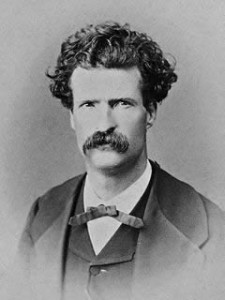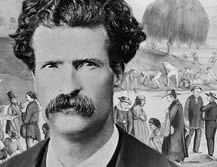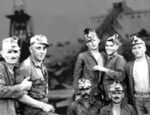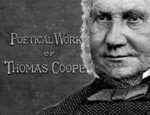Description
 Meet the classically educated ‘Old Collegiate’, an ageing gold prospector fallen on hard times whom Mark Twain befriended in California in the 1860s and described, in the mouth of his semi-autobiographical narrator Sam, in Roughing It (1872):
Meet the classically educated ‘Old Collegiate’, an ageing gold prospector fallen on hard times whom Mark Twain befriended in California in the 1860s and described, in the mouth of his semi-autobiographical narrator Sam, in Roughing It (1872):
‘One of my associates in this locality, for two or three months, was a man who had had a university education; but now for eighteen years he had decayed there by inches, a bearded, rough-clad, clay-stained miner, and at times, among his sighings and soliloquizings, he unconsciously interjected vaguely remembered Latin and Greek sentences—dead and musty tongues, meet vehicles for the thoughts of one whose dreams were all of the past, whose life was a failure; a tired man, burdened with the present, and indifferent to the future; a man without ties, hopes, interests, waiting for rest and the end.’
There were indeed college-educated entrepeneurs amongst the three hundred thousand people who arrived in California during the great Gold Rush of 1849-1855; there were people of every class, social profile and ethnicity, including African Americans and Native Americans as well as white prospectors from the east like the Old Collegiate. A few of them were still there when Twain explored Nevada and California as a young man years later, himself conflicted about class and money. His father was a judge, but had died when Twain was a boy, meaning he received no university education himself.
In this passage, Twain uses the old man’s dimly remembered Greek and Latin texts to symbolise the threat presented to the old class system by the seismic economic, social and military upheavals experienced by Americans in the mid-19th century. As Twain forges his own new brand of distinctively gritty American realism, half-way between biography and fiction, musty inherited literary forms and tongues are presented as obsolete but apt ‘vehicles for the thoughts of one whose dreams were all of the past.’
But the Old Collegiate is crucial to the text as an embedded older version of Twain himself. His tumble down the social ladder reflects Twain’s own deep ambivalence towards the class structure of American society, and his struggle to reconcile his own fascination with the rough workers and adventurers of the western frontier with his attraction to the elite literary circles and saloons of the east.







